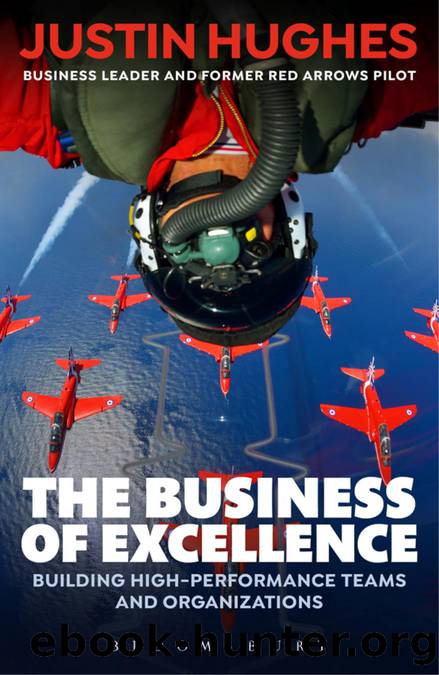The Business of Excellence by Hughes Justin;

Author:Hughes, Justin;
Language: eng
Format: epub
Publisher: Bloomsbury Publishing Plc
Published: 2019-11-24T00:00:00+00:00
The concept of briefing
There gets to be a point at which the time for discussion, brainstorming, challenging ideas and planning is over and it is time to get stuff done. You had your chance to argue your point, and either your input was incorporated or it wasnât. Either way, it is now time to unite behind a plan and start to implement. It is far, far better to unite behind an imperfect plan and execute well with a common approach to deliver the desired outcome, than to continue to debate, argue and pursue individual agendas and ideas in the pursuit of a perfect plan. Is there such a thing anyway? Weâd like to have the best plan possible in order to stack the odds of success in our favour; however, we know that no plan survives its collision with the real world. Any of the spectrum of plans that would have worked was, by definition, good enough. Execution is the only thing on which you are ultimately measured.
However, even with an imperfect plan, it is critical that we have a common approach and are all pulling in the same direction; this is one of the key drivers of outstanding execution and this is where the brief comes in. Our experience is that teams and organizations do a lot of executing, sometimes interspersed with some planning. However, briefing and debriefing are surprisingly rare commodities. Briefing in particular is a relatively quick and easy win compared to debriefing; it really is a no-brainer as a driver of performance. If youâre putting all that effort into defining task clarity, role clarity and the allocation of resources, you might as well make sure that everybody understands it.
Briefing is different to planning. That may well fall into the category of âstatements of the blindingly obviousâ, but the key point for me is that planning is a team game, whereas briefing is a leadership game. If I am leading on a task, I want all the brainpower engaged on the plan. It may be that somebody has to have the decision-making authority to choose between alternative approaches, but I want the highest number of quality options to choose from and all the relevant subject matter experts working on their own bits of the plan.
However, briefing is where the discussion stops and the leader confirms to the team what the final plan actually is. The communication of the plan can take many forms, but at a tactical level itâs where the leader stands up in front of the team and defines the roles, responsibility and accountability for who will do what, when, why and how. This is the factual bit â the process. However, the conduct of the brief also offers a chance to set the professional standard, get people engaged and focused on the task, and at its best, to motivate and inspire. I guarantee that I would be able to tell you within 60 seconds of the start of a fighter mission brief whether the mission is likely to be a success or not, simply by the leaderâs manner.
Download
This site does not store any files on its server. We only index and link to content provided by other sites. Please contact the content providers to delete copyright contents if any and email us, we'll remove relevant links or contents immediately.
Hit Refresh by Satya Nadella(8854)
The Compound Effect by Darren Hardy(8508)
Change Your Questions, Change Your Life by Marilee Adams(7373)
Nudge - Improving Decisions about Health, Wealth, and Happiness by Thaler Sunstein(7242)
The Black Swan by Nassim Nicholas Taleb(6764)
Deep Work by Cal Newport(6563)
Daring Greatly by Brene Brown(6224)
Rich Dad Poor Dad by Robert T. Kiyosaki(6175)
Principles: Life and Work by Ray Dalio(5961)
Man-made Catastrophes and Risk Information Concealment by Dmitry Chernov & Didier Sornette(5647)
Playing to Win_ How Strategy Really Works by A.G. Lafley & Roger L. Martin(5500)
Digital Minimalism by Cal Newport;(5389)
Big Magic: Creative Living Beyond Fear by Elizabeth Gilbert(5351)
The Myth of the Strong Leader by Archie Brown(5237)
The Slight Edge by Jeff Olson(5200)
Discipline Equals Freedom by Jocko Willink(5157)
The Motivation Myth by Jeff Haden(5003)
Stone's Rules by Roger Stone(4857)
The Laws of Human Nature by Robert Greene(4773)
